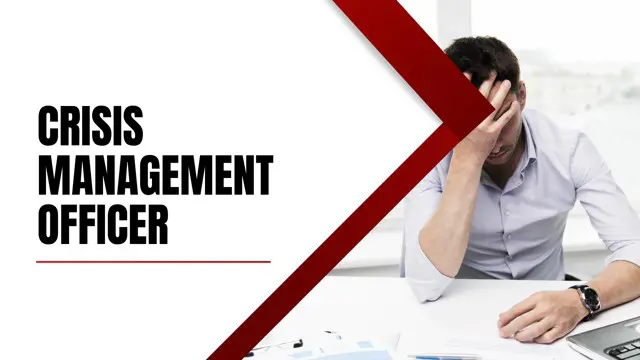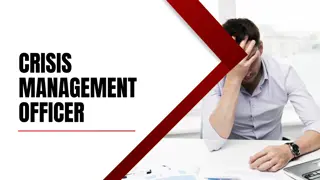
Crisis Management Officer
CPD Certified| Free PDF Certificate | Lifetime Access | Learner Support | No Hidden Fees | 100% Success Rate
EDURISE
Summary
- Certificate of completion - Free
- Reed courses certificate of completion - Free
- Tutor is available to students
Add to basket or enquire
Overview
In today's dynamic world, the need for Crisis Management Officers is paramount. Explore why this role is indispensable in safeguarding businesses:
Risk Mitigation: Crisis Management Officers are the guardians of risk mitigation. They identify potential threats, develop strategies, and ensure organizations are prepared for the unexpected.
Business Continuity: Ensuring business continuity is non-negotiable. Crisis Management Officers create robust plans to navigate crises, minimizing disruptions and protecting a company's reputation.
Reputation Management: Reputation is priceless. These officers excel at reputation management, employing communication strategies that inspire trust and confidence, even in the face of adversity.
Strategic Thinking: Crisis Management Officers are strategic thinkers. They analyze complex situations, make informed decisions, and lead teams with grace under pressure.
Adaptability: In an ever-changing world, adaptability is key. These officers thrive in uncertainty, embracing challenges and turning them into opportunities for growth.
Global Impact: Crisis Management transcends industries. Professionals in this field make a global impact, safeguarding organizations in finance, healthcare, tech, and more.
Effective Leadership: Effective leadership is a cornerstone. Crisis Management Officers lead by example, fostering resilience and teamwork within their organizations.
Stakeholder Engagement: Engaging stakeholders is an art. These officers excel at building strong relationships with stakeholders, from employees to the public and beyond.
Career Growth: For those seeking a dynamic career with a lasting impact, Crisis Management offers abundant opportunities for growth and professional development.
The Art of Calm: Crisis Management Officers remain the calm in the storm, guiding organizations through tumultuous times with confidence and poise.
Join us in the world of Crisis Management and become a beacon of resilience. Master the art of strategic thinking, risk mitigation, and reputation management to safeguard organizations in an ever-changing landscape.
Free Gift
- Course Completion PDF Certificate
- Tutor Support
- Free Session with professionals
Curriculum
Course media
Description
Learning Outcomes:
Upon completing this course, students will be able to:
Technical Proficiency: Gain a solid foundation in technician knowledge, enabling the understanding of complex HVAC systems and electrical components.
Safety and Installation: Master the art of secure installation, ensuring safety protocols are followed when working with heating, ventilation, and air conditioning systems.
Measurement and Schematic Interpretation: Acquire the skills to interpret measurements and schematics accurately, facilitating efficient troubleshooting and system control.
Control Devices Mastery: Understand the intricacies of controlling devices within HVAC systems, allowing for precise management and optimization.
Troubleshooting Expertise: Develop troubleshooting expertise specific to heating, ventilation, and air conditioning systems, identifying and rectifying issues effectively.
Module 01: Let’s know about Technician
Module 01 serves as an introduction to the world of technicians. It provides an overview of the role and responsibilities, setting the stage for a comprehensive understanding of the field.
Module 02: Working with Electricity (Heating, Ventilation, and Air Conditioning)
In Module 02, you'll dive into the essential skills required to work with electricity in the context of heating, ventilation, and air conditioning systems. Safety measures and practical techniques will be covered.
Module 03: The Measurements & Schematics
Module 03 focuses on measurements and schematics. You'll learn how to interpret measurements accurately and understand schematics to effectively troubleshoot HVAC systems.
Module 04: Secure Installation
Module 04 delves into secure installation practices. Safety is paramount when working with HVAC systems, and this module equips you with the knowledge and skills to ensure secure installations.
Module 05: Controlling Devices
Module 05 explores the intricacies of controlling devices within HVAC systems. You'll learn how to manage and optimize these devices for efficient system operation.
Module 06: Troubleshooting (Heating, Ventilation, and Air Conditioning)
In Module 06, you'll become an expert in troubleshooting heating, ventilation, and air conditioning systems. Identify and resolve issues efficiently, ensuring smooth system functionality.
Certificate of Completion
After completing the Crisis Management Officer diploma course, you will be able to obtain your free PDF certificate of course completion.
Who is this course for?
Ideal Audience for This Course:
HVAC Enthusiasts: Individuals passionate about heating, ventilation, and air conditioning (HVAC) systems who want to deepen their knowledge and skills in this field.
Aspiring HVAC Technicians: Those aspiring to become HVAC technicians and embark on a career in HVAC system installation, maintenance, and troubleshooting.
Electrical Technicians: Electrical technicians seeking specialization in HVAC systems to expand their career opportunities and expertise.
Maintenance Professionals: Maintenance professionals working in commercial or residential settings who wish to enhance their HVAC system knowledge for effective maintenance.
Facility Managers: Facility managers responsible for the operation and maintenance of HVAC systems in buildings and facilities.
Building Engineers: Building engineers looking to develop a comprehensive understanding of HVAC systems for efficient building operations.
DIY Enthusiasts: DIY enthusiasts interested in understanding HVAC systems for personal projects or home improvement.
Environmental Engineers: Environmental engineers interested in the technical aspects of HVAC systems and their impact on indoor air quality and energy efficiency.
Technical Students: Students pursuing technical education and training in fields related to HVAC, electrical systems, or facility management.
This course caters to a diverse audience interested in gaining expertise in HVAC systems, without focusing on practical skills or certifications. It offers valuable knowledge for personal enrichment or career development in HVAC-related roles.
Requirements
The Crisis Management Officer course has no formal entry requirements. However, to study the Crisis Management Officer course students must:
Have passion for virtual learning
Have a good understanding of English, as well as numeracy and IT skills
Have a desire for Crisis Management Officer topic
Be over the age of 16
Career path
- Crisis Management Specialist: Competitive salaries in the field of crisis management.
- Crisis Response Coordinator: Earn attractive compensation packages.
- Crisis Management Director: Experienced professionals may command higher salaries.
Note: Salary in crisis management varies based on factors such as industry, organization size, and individual qualifications.
Questions and answers
Currently there are no Q&As for this course. Be the first to ask a question.
Certificates
Certificate of completion
Digital certificate - Included
Reed courses certificate of completion
Digital certificate - Included
Will be downloadable when all lectures have been completed
Reviews
Currently there are no reviews for this course. Be the first to leave a review.
Legal information
This course is advertised on reed.co.uk by the Course Provider, whose terms and conditions apply. Purchases are made directly from the Course Provider, and as such, content and materials are supplied by the Course Provider directly. Reed is acting as agent and not reseller in relation to this course. Reed's only responsibility is to facilitate your payment for the course. It is your responsibility to review and agree to the Course Provider's terms and conditions and satisfy yourself as to the suitability of the course you intend to purchase. Reed will not have any responsibility for the content of the course and/or associated materials.


